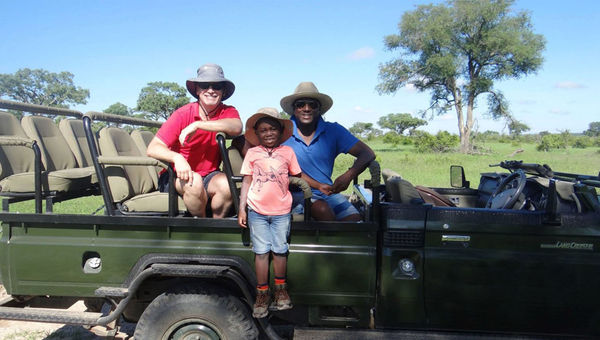
Dorine Reinstein
The recent criminalization of homosexuality in Uganda has dealt a heavy blow to Africa's reputation as an inclusive and friendly destination for the LGBTQ+ community. It has also raised questions on the safety and acceptance of LGBTQ+ individuals traveling to Africa.
At the end of May Uganda's president, Yoweri Museveni, signed a bill criminalizing same-sex conduct, including potentially the death penalty for those convicted of "aggravated homosexuality," into law.
It was a shocking development for many in the tourism industry and one with ripple effects on regional perceptions, according to John Tanzella, president/CEO of the International LGBTQ+ Travel Association (IGLTA).
• Cover story: The gay cruise comes of age
"When a country enacts or reinforces homophobic laws, it creates a negative image that can deter LGBTQ+ travelers from considering other African destinations. Concerns about safety and acceptance may arise in countries with more inclusive policies, simply due to the association with the region. We've seen this before in other parts of the world, as well, like the Caribbean, with people failing to distinguish between the laws of individual countries and the entire region," said Tanzella.
However, painting all of Africa with the same brush is both unfair and incorrect, Tanzella asserted. This is where the travel industry has a pivotal role to play.
"When homophobia is on the rise in Poland, travel advisors don't panic about sending LGBTQ+ travelers to Europe," he said, adding that destinations need to be viewed individually. "South Africa, with its progressive constitution and visible queer communities, deserves promotion rather than punishment for attitudes in other countries. Education is key, and travel advisors need to be well-versed in explaining the realities of Africa and distinguishing countries from one another."

Sherwin Banda, president of African Travel Inc., and his family on safari. Photo Credit: Courtesy of African Travel Inc.
A big, diverse and welcoming continent
Sherwin Banda, president of African Travel Inc., agreed with Tanzella, saying it is important to remind travelers that Africa is a huge, diverse continent, and like the U.S. and Europe, there is a diverse set of nations and cultures. "There are many camps, lodges and nations that are supportive and inclusive and welcoming to all," he said.
According to Banda, Africa -- and South Africa and Botswana in particular -- continues to be an attractive destination for LGBTQ+ guests. He mentioned he has seen a notable increase in bookings for LGBTQ+ multigenerational families and couples who want to splurge on luxury, tailor-made travel and staying longer to explore the continent.
For travel consultants, it can be incredibly challenging, however, to balance the promotion of LGBTQ-friendly destinations like South Africa while dealing with less welcoming or even hostile countries. Tanzella's advice is to provide accurate information about the local LGBTQ+ climate and promote conversations about LGBTQ+ rights that foster transparency and empower travelers to make informed decisions.
Justin Francis, co-founder and CEO of Responsible Travel, added that the lack of clear, up-to-date information can be a huge challenge -- for agents as well as travelers -- but it's important not to shy away from these difficult issues.
His advice is to include or link to reliable, up-to-date information online and be ready to discuss concerns with travelers so they can make their own informed decisions.
• Related: LGBTQ+ travel a focal point at two Africa travel shows
"You should be able to provide relevant information about your trips, backed up by on-the-ground research with local accommodations, tour guides, drivers and so on," Francis said.
"Be honest, too. It's impossible for any holiday company to guarantee that travelers will be free of harassment or discrimination, no matter where they go or what precautions are taken. Do your research and encourage travelers to do likewise. But acknowledge your limitations. Travelers won't thank you for claiming more knowledge than you have or pretending things are fine. Instead, consult the experts where you need to, so you have a few reputable sources of simple, up-to-date information, like the Human Dignity Trust."
"Travel agencies and advisors need to work with companies who have a proven track record in creating safaris for the LGBTQ+ traveler," Banda added. "It is important to ask African companies or tour operators how they promote or include diversity and inclusion in their business. Do they hire from underrepresented communities? What training do they provide to staff to interact with LGBTQ+ guests?"
Acceptance is growing
Despite the setback in Uganda, African travel trends for the LGBTQ+ community have positively evolved over the years and will continue to evolve. "We have seen an increase in LGBTQ+ visibility and acceptance in many African countries," Tanzella said.
Banda added that an inclusive mindset is spreading throughout Africa. "While strides may have started in South Africa, we do see change moving north across Africa," he noted. "Many African countries were isolated for decades, but through digital technology and travel, more Africans are connecting with people and new ideas. As these Africans in more isolated places are exposed to different cultures, we see mindsets changing."
Tanzella anticipates a continued shift toward LGBTQ+ inclusivity as more countries recognize the economic and social benefits of embracing diversity.
"It will require ongoing advocacy, education and collaboration between stakeholders to create a more welcoming environment across the continent," he concluded.